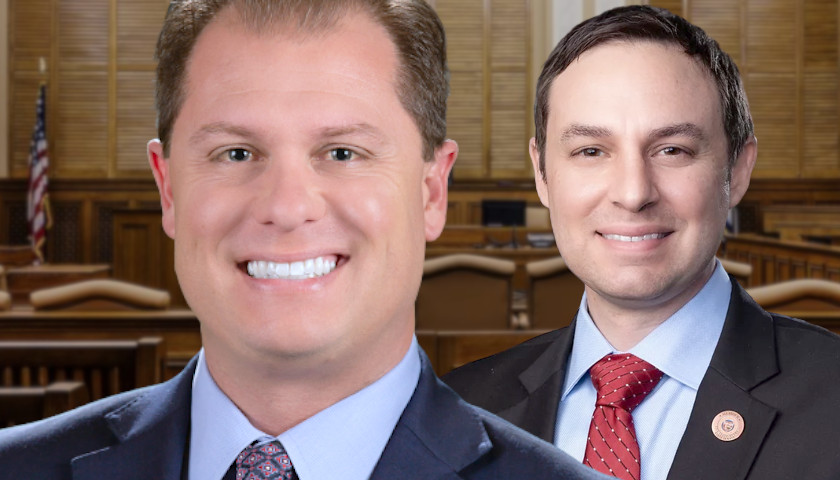Only three election integrity bills made it into law this past legislative year in Arizona, and at least two of them are now subject to lawsuits from progressives and Democrats. Five lawsuits have been filed against HB 2492, which requires proof of citizenship in order to register to vote — with the exception of voting in congressional elections, which is pre-empted by federal law. Two lawsuits have been filed against SB 1260, which makes it a felony to knowingly help someone to register to vote when the person is already registered in another state.
State Representative Jake Hoffman (R-Queen Creek), who sponsored HB 2492, told The Arizona Sun Times, “Since Jim Crow, when the courts were used by Democrats to institutionalize racism against black Americans, the Democrat Party and their operatives have a long track record of exploiting the judiciary branch of our government as a back door for enacting their anti-civil rights agenda.”
He added, “Make no mistake, Democrats have made it clear with their lawsuits against my legislation that they want non-citizens to vote in U.S. elections — a direct assault on the right of every American to free and secure elections.”
The DNC and Arizona Democratic Party filed the fifth lawsuit against HB 2492 on Monday. The Biden administration’s justice department previously filed a lawsuit. Living United for Change in Arizona, the League of United Latin American Citizens, the Arizona Students’ Association and a wing of the Arizona Democracy Resource Center, ADRC Action filed a lawsuit earlier as well with the help of the Washington, D.C.-based Campaign Legal Center. Mi Familia Vota filed a lawsuit represented by Democratic activist lawyer Marc Elias.
Also on Monday, Priorities USA — which is the Democratic Party’s biggest Super PAC — along with the labor union-affiliated Arizona Alliance for Retired Americans, and Voto Latino filed a lawsuit against SB 1260, which was sponsored by State Senator J.D. Mesnard (R-Chandler). In addition to criminalizing knowingly helping someone illegally register to vote in two states, the law also asks residents who receive someone else’s ballot in the mail to send it back to the county with a note that the voter is “not at this address.” County recorders will then remove the voter from the state’s active early voting list.
The plaintiffs suing the state over SB 1260 assert, “SB 1260 has no rational connection to any legitimate government purpose. It will not improve election integrity or prevent election fraud.” Maria Teresa Kumar, President, and CEO of Voto Latino, said in a statement, “This law is aimed directly at the Latino community.”
The plaintiffs listed various complaints about possible scenarios that some people could find objectionable. For example, they contend that people conducting voter registration drives will be more concerned about breaking the law. They said people who move more frequently than others, such as young people and minorities, will be more likely to be removed from the active early voting list. The worst scenario, they said, would be political operatives targeting certain people groups by sending the county recorders third-party information for the recorders to investigate.
The plaintiffs suing the state over HB 2492 contend that “HB 2492 imposes severe burdens on Arizona citizens’ ability to vote with no corresponding justification.” They asserted, “The Arizona Legislature did not identify any evidence that the existing structure was not adequately serving …” the aim of ensuring “that only eligible voters could vote.”
They say that federal law pre-empts the law, due to the Supreme Court striking down a somewhat similar Arizona law in 2013, a voter initiative known as Protect Arizona Now. However, Hoffman specifically drafted HB 2492 to avoid this conflict, exempting voters who only intend to vote in congressional elections.
In 2018, then-Secretary of State Michele Reagan agreed to settle with a left-wing organization that had sued the state over requiring proof of citizenship in order to vote in federal elections, instead of fighting the lawsuit. Gina Swoboda, executive director of the Voter Reference Foundation, said if Reagan had fought the lawsuit, she likely would have prevailed.
As a result, Greg Blackie, deputy director of policy for the Arizona Free Enterprise Club, estimated the number of non-citizens illegally voting in Arizona went from 1,600 in 2018 to 11,600 in 2020 — more than the number by which Donald Trump lost to Joe Biden in the state. Currently, voters who do not provide proof of citizenship are provided a federal-only form to register to vote, the number of applications of which grew from about 1,700 in 2018 to 31,000 in 2020.
– – –
Rachel Alexander is a reporter at The Arizona Sun Times and The Star News Network. Follow Rachel on Twitter. Email tips to [email protected].





